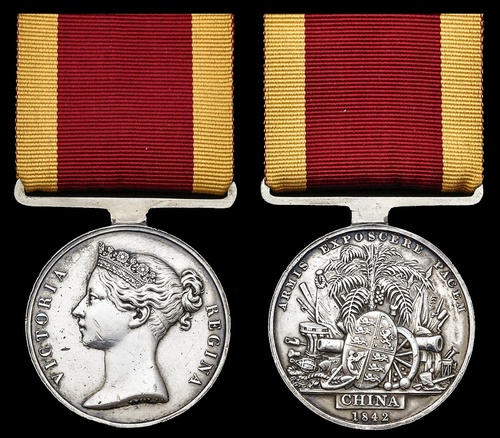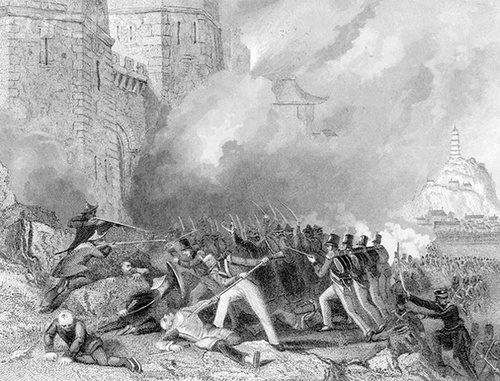Auction: 17002 - Orders, Decorations and Medals
Lot: 23
'The scaling ladders had been brought up in most difficult and rugged heights by the great exertions off the Madras Sappers and were gallantly planted under the direction of Captain Pears, who was the first to ascend.'
So states Sir Hugh Gough's despatch for the capture of Tinghai, dated 3 October 1841.
An important China 1842 Medal awarded to Major-General Sir Thomas Pears, K.C.B., Military Secretary to the India Office, late Madras Sappers & Miners, who served as Sir Hugh Gough's Commanding Engineer during the First Opium War 1841-42: often mentioned in despatches, he was awarded the C.B. and a Brevet Majority at the war's end
China 1842 (T. T. Pears, Captain Madras Sappers & Miners), original straight-bar suspension, very fine
Thomas Townsend Pears was born in May 1809, the son of the Rev. J. Pears, Headmaster of Bath Grammar School.
Young Thomas attended Addiscombe and was commissioned 2nd Lieutenant in the Madras Sappers & Miners in June 1825. Following early service in India, he returned overland via Persia in 1836 and was appointed Chief Engineer with the Force at Karnul. He otherwise occupied himself in experimenting with 'the planting of mines at sea', a paper being published in the Spring of 1839.
First Opium War 1840-42 - Commanding Engineer - C.B.
Pears was ordered to China in 1840, where he first served as a Field Engineer and took part in the capture of the island of Chusan.
In the following year, he was appointed Commanding Engineer under Sir Hugh Gough, in which capacity he greatly distinguished himself, an early case in point being his gallantry at the capture of the city of Tinghai, as quoted above. After the capture of the fortified city and heights of Chapoo, Pears was again favourably mentioned for his judgment and gallantry in placing the powder-bags which blew in the defences of a fort where a desperate resistance was offered.
In fact, with the exception of the attack on Canton and the bombardment of Amoy, Pears was present as Commanding Engineer in every action fought by Sir Hugh Gough's army in the China campaign 1841-42. He was awarded the C.B. and a Brevet Majority.
Postscript
On returning to India, Pears was prominent in the development of the railway networks in his capacity as Consulting Engineer for Railways. He served latterly as Chief Engineer of Mysore and attained the rank of Major-General in February 1861.
On returning to England on his retirement, he took up post as Military Secretary to the India Office, in which role he was commended for his part in planning arrangements for the Abyssinia campaign of 1867. He was elevated to K.C.B. (London Gazette 13 June 1871, refers).
The General died at his home - Eton Lodge, Putney - in October 1892 and was buried at Mortlake Cemetery.
Journals from his military career are held by the British Library: Asian and African studies MSS Eur B368 and E125.
For his son's Afghanistan 1878-80 Medal, please see Lot 57.
Subject to 20% VAT on Buyer’s Premium. For more information please view Terms and Conditions for Buyers.
Sold for
£3,500







